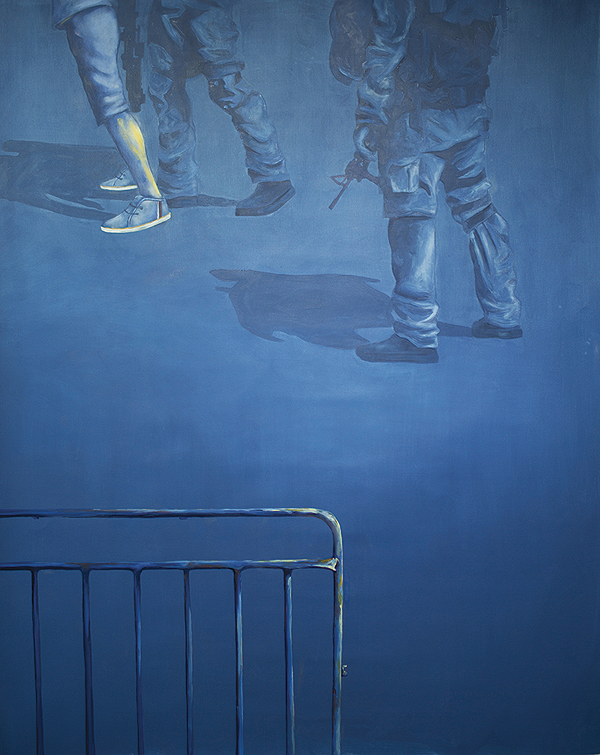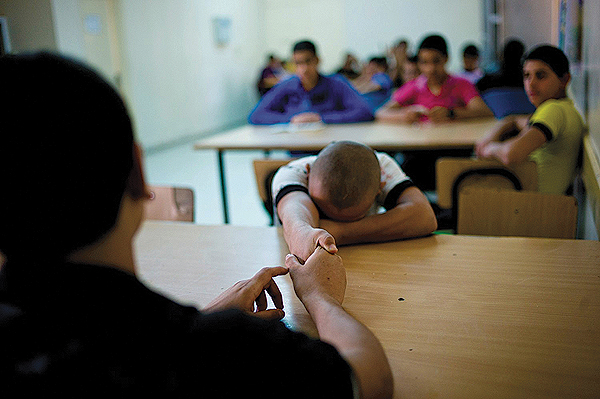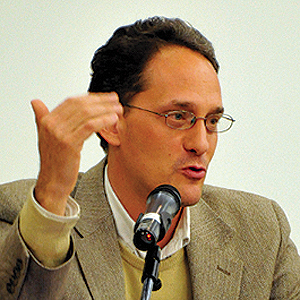A Terre des hommes colleague was visiting a Global South country some years back, when he received a wake-up call that he remembers to this day. As he was explaining the importance of alternatives to detention for young people who offend, a local judge responded: “We know what alternatives to detention are, our wise men have been doing it for centuries. In fact they predate the arrival of Europeans who established the first prisons here.” Blushing face emoticon.
As a Swiss organization that strives to keep a humble and neutral perspective, we wonder whether, in the face of rising criminality amongst young Palestinians, it would not be better to invest in local conflict-resolution mechanisms that have existed from time immemorial than to build more “Juvees” (detention facilities for youth) and rehabilitation centers?
The twentieth century has brought tremendous progress in terms of rule of law, standards setting, and institutionalization of justice, but it ended with the realization that the notion of monopoly of justice has limits. Confronted with high delinquency rates, state justice often struggles to render justice promptly and effectively. It still functions, for the most part, under an old paradigm in which retributive justice and detention are the default position. More delinquency means more prisons.i Other approaches are possible and might prove more successful.
In a context of prolonged occupation in which the existence and desirability of one, two, or even three states will continue to be debated in the foreseeable future, a conception in which a state would have an absolute monopoly over justice on all citizens and for all types of offences is neither realistic nor desirable.ii A more modern conception of justice is, paradoxically, found in the way Palestinian communities have always dealt with problems in their midst: informal or customary justice.iii
♦ When up to 95 percent of cases involve informal actors, they can no longer be ignored. States that once overlooked or combated customary judges are now training them as alternative dispute-resolution experts or arbitrators. Counter-intuitively, trained traditional actors can be one of the most modern ways of dealing with children in conflict with the law.
For centuries, communities have brought cases of children in conflict with the law to the people they trust: mukhtars, the equivalent of mayors, and islah men, the people of reconciliation. Of note, the act of “reconciling” is not done exclusively by men. Today with the help of UNDP, UNICEF, and our local allies, “islah women” are coming to light. We have mapped forty of them in the Gaza Strip alone. It is exciting to be working with female leaders who have the well-being and protection of girls and boys at heart.
As for the state officials we meet and work with (police officers, social workers, prosecutors, and judges), they seem to rely on an informal justice system (IJS) and most of them cannot imagine a world without mukhtars and islah men and women. A symbiotic relationship has emerged between state and non-state actors. Children get released from detention the minute their families produce sulh papers, namely reconciliation documents. It takes on average a week for informal actors to bring about a solution between disputing parties.

The prevalence and effectiveness of this informal system, which according to our calculations can deal with up to 95 percent of cases in Gaza, does not mean that it is necessarily good for children. To examine the extent of appropriate outcomes in such intervention, Terre des hommes (Tdh) has collected a huge amount of qualitative and quantitative information. Research was first conducted on informal justice in cases dealing with children in the Hebron governorate.iv Subsequently, Tdh embarked on an ambitious, longitudinal data collection drive.v An analysis of 228 cases collected in Gaza between January and November 2016 revolved around three questions. First: “Were the terms of the outcome reasonable and proportionate to the dispute?” In our assessment this was fully the case for 37 percent of entries, 42 percent partially and 21 percent not the case. The second question, “Did the outcome meet the needs and contribute to rehabilitation of the children?” showed a 23 percent prevalence of “yes,” 57 percent “partially,” and 19 percent “no.” To the third question: “Did the process contribute to reparation of harm done to community?” local experts answered yes (25 percent), partially (57 percent), and no (18 percent).

At first glance, IJS performance may appear wholly insufficient: informal actors are performing well in between a quarter and a third of cases while we aim at 100 percent positive outcomes for children. However, these figures put an end to the assertion that informal actors would be systematically violating child rights, or that they would be inherently bad. Our thinking towards them needs to evolve. Instead of patronizing informal actors we need to fully engage with them, identify role models, help them cut down on discrimination against girls, and gain full legitimacy. Above all, they need to work in sync with the formal system and stop adjudicating criminal matters. As per the Juvenile Protection Law 2016, they can only mediate in misdemeanor and minor offences but have a vital role in avoiding detention of children.
♦ Firsthand quantitative data sheds light on the dilemma whether informal justice actors make decisions in the best interests of children. Preliminary analysis suggests that the lower the matter, the most likely it is for the decision to be in the best interests of the child. Half of decisions (50 percent) in personal-status disputes were found to be fully or partially in the best interests of children, whereas decisions dealing with crimes such as sexual assault (41.7 percent) and fights (34.8 percent) were less likely to be appropriate.
I mentioned the blushing face of a colleague who received a stark reminder of local wisdom. We must learn the lesson and systematically look for local answers without romanticizing them. Looking forward, we believe it will not take long before informal actors are recognized globally as key components of any child-friendly justice system. When that happens, the State of Palestine will be seen as a model to follow. Disbelief emoticon?
» Joseph Aguettant is the Country Representative of Terre des hommes Foundation in Palestine. A lawyer by training, Mr. Aguettant has over 20 years of experience across a range of protection issues, including Justice for Children. He is a senior fellow with the Centre for Children, Law and Ethics, Cumberland Law School, Samford University, United States. Mr. Aguettant graduated with distinction from University of Paris (DESS in Public International Law) and University of Geneva (CAS).
Acknowledgements
The author of this article would like to acknowledge the invaluable contribution of the Tdh team in Palestine, in particular Dr. Khitam Abu Hamad’s analysis, without which this article would not have been possible. He is indebted to Kristen Hope and Yann Colliou for their leadership of the informal justice systems innovation.
i This article does not deal with the issue of children (sometimes as young as nine) who are arrested by Israeli forces. It focuses on children in conflict with Palestinian law, arrested by Palestinian police.
ii One could argue that in a context where existing state structures are weakened by the occupation and struggling daily to carry out their mandates, state structures should be further reinforced. This is a fact. Seeking hybridity between formal and informal components will reinforce state structures. The idea of a “hybrid” model for justice is borrowed from Ali Wardak and John Braithwaite’s work in Afghanistan, which represents a synergy between state and non-state justice systems and human rights institutions, with well-established checks and balances. See Wardak, A., Braithwaite, J. (2013). “Crime and War in Afghanistan. Part II: A Jeffersonian Alternative?” British Journal of Criminology, 53, p. 179–214
iii Informal justice refers to the resolution of disputes and the regulation of conduct by adjudication or with the assistance of a neutral third party that is not part of the judiciary as established by law and whose substantive, procedural, or structural foundation is not primarily based on statutory law.
iv Terre des Hommes, Children in Conflict with the Law and Informal Justice System in Hebron Governorate, 2013, 54 p.
v In accordance with Tdh’s institutional policies, all activities with children strictly adhere to the highest ethical principles of child protection, namely: obtain informed consent; do no harm; guard confidentiality; and secure provision of support. All cases of children collected were anonymous, no names were recorded.


